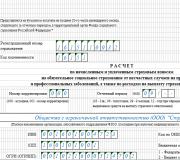There is no point in blaming the mirror if your face is crooked. (Epigraph and plot of the comedy N
Konstantin Shcherbakov, " Theater life", 05.2016
“There is no point in blaming the mirror if your face is crooked,” - a popular proverb, epigraph to “The Inspector General.”
When the curvature of a face acquires phantasmagoric parameters, a theater of the absurd arises. Great Theater, the main sources and beginnings of which are in Russian prose, Russian dramaturgy XIX century. Drama, which has the ability to be born anew at decisive historical crossroads, and its characters, looking around, turn to you and me with the question: where are we?
The home of Michal Vasilich Krechinsky, located at Novy Arbat, 11 (the Hermitage Theater is showing the premiere there of Sukhovo-Kobylin’s play “Krechinsky’s Wedding” staged by Mikhail Levitin) is dedicated to a portrait of a supposedly high-ranking ancestor. The portrait was made in such a manner that if you hung it upside down, at all angles, it would hardly be noticed. However, Michal Vasilich, having looked closely, will probably recognize himself in the crookedness of the dignitary’s portrait. For he is a great expert on this part, on the part of surrounding curvature, picturesque and all other things. Not only an expert, but an architect, a creator. This is how Evgeniy Redko plays him.
To say: Russian absurdity is to say almost nothing. Russian absurdity - it is extremely, stunningly different.
Gogol's laughter through tears, when a wave of sympathy takes over you when you look not only at Podkolesin and Agafya Tikhonovna, but also at Gorodnichy and his family.
In the play “Balalaikin and Co.” (1973, Tovstonogov, “Contemporary”, based on the “Modern Idyll” by the stern, merciless Saltykov-Shchedrin), the most poignant moments are the desperate outbursts of shame that occurred in the souls of the painfully deteriorating characters.
In Evgeniy Redko’s Krechinsky there is not a drop of shame, in Mikhail Levitin’s performance there is not an ounce of sympathy, and the curvature of faces is not necessarily the curvature of faces, but necessarily the curvature of souls.
Sometimes you hear: the charm of evil. What it is? Krechinsky in the performance of the Hermitage is the embodiment of this charm. You certainly take his word for it when you find out that stupid Lidochka Muromskaya is far from his first victim. Krechinsky Evgenia Redko is a man of all-crushing passion: game, adventure, money, power - step by step, and if it fails - well, let's start again.
It seemed to me that “Krechinsky’s Wedding” was something apart, it was still in line with Ostrovsky, not quite Sukhovo-Kobylin. Not so in Levitin's play. Here, perhaps, the whole of Sukhovo-Kobylin is played, with stylistic and semantic approaches to both “The Case” and “The Death of Tarelkin.”
Well, here’s Krechinsky’s entourage. To put it delicately - a team, to put it precisely - a pack, where Krechinsky is the leader.
Fedor's valet is artist Alexander Pozharov. It seemed like a service character. Written - very few lines. It was played - through the exchange of glances and gestures with Krechinsky, when not even half a word is needed for complete mutual understanding - the long-term cooperation of the most experienced two, of whom each knows exactly his place, was played. Fedor - to maintain everyday respectability.
Rasplyuev - to carry out dubious, dirty orders. Here, performed by the artist Konstantin Tumilovich, the curvature is off the charts. Here is not the charm of evil, but its cast-offs. I remember the grotesques of early Ilyinsky, Garin, Martinson. I thought - isn't it too much? No, not too much. I hope what has been said to a young artist won't hurt.
Cast-offs - should we throw them away as unnecessary? No, you can't throw it away. All three - Krechinsky, Fedor, Rasplyuev - are so connected that they can no longer survive separately. Moreover, behind them - stretch a little imagination - you can guess assistants, advisers, managers, killers, secretaries. A flock greedily capturing living space.
Such a capture is not a difficult job, and this is the bitterest bitterness of the performance on Novy Arbat, 11. Who is good, who is proud of? This is from Mayakovsky. Aunt Anna Antonovna (artist Daria Belousova) with her severe phase shift due to social glitter-cod? Bow-legged (crooked again!) freak Nelkin (artist Stanislav Sukharev) - well, what good is he to do against Krechinsky, even if he lost? Muromsky (artist Sergei Oleksyak), his daughter Lidochka (artist Alla Chernykh) with their stable residence in empty space?
The sheep are walking in a row,
The drums are beating.
They give them skin
The sheep themselves.
This is from Bertolt Brecht.
Probably, one can have compassion for sheep, but suddenly - out of the blue - I remembered other living creatures.
I read somewhere: flayers have appeared in Moscow, who, blocking the only exit from the basement of their house, wall up stray cats there that have found shelter for the winter. And I thought: what would I feel if I heard the moan of a walled up cat?
There are a lot of homeless cats these days, and their screams are mixed with human screams.
In Levitin's play there are no sheep or cats, but there is a menagerie of its own. Krechinsky first appears on stage in the guise of a bull with red eyes, leading a chain of characters subordinate to him. (In “The Shadow” by Schwartz, one of Levitin’s previous performances, the Shadow, performed by the same Evgeniy Redko, also led an obedient round dance, but there she was still a shadow, but here, in “Krechinsky”, she became stronger, so rooted, that it’s just right to cast the shadow itself.)
So, then, the bull - by the way, is from the play: Krechinsky gives it to Muromsky, who has completely softened from such a gift. And yet - a smoked pork carcass, by the will of the artist Maria Krivtsova, who knows how, took the place of a massive veche bell on stage, which, presumably, never sounded. Well, and a portrait, a portrait of a high-ranking ancestor. Under the sophisticated mocking music of Vladimir Dashkevich, everything on Novy Arbat, 11, became muddled and confused.
And I suddenly wanted to scream: it’s not me - the bandy-legged freak! And the severe phase shift is not for me! And it’s a stranger’s moan from a walled-up basement. Stranger! Alien... What if - not a stranger?
So why blame the mirror? Immense Russian absurdity. One of his incarnations.
I admit that the play “Krechnisky’s Wedding on Novy Arbat 11” lacks a humanistic beginning. But how to be worthy of this beginning is something that also doesn’t hurt to think about. To all of us. At least in order not to be on the verge of a not entirely humanistic end.
“There’s no point in blaming the mirror if your face is crooked.” (Epigraph and plot of N.V. Gogol’s comedy “The Inspector General.”)
As an epigraph to my immortal comedy N.V. Gogol took famous proverb“There’s no point in blaming the mirror if your face is crooked.”
The epigraph did not appear immediately, but six years after the comedy was published. It became Gogol's response to numerous critics who literally attacked both the play itself and its author. They probably recognized themselves in the heroes of the comedy. After all, Gogol brought almost all Russian characters to the stage. The social vices generated by serfdom, - bribery, embezzlement, laziness, servility, and many others. Gogol showed them so vividly and convincingly that the comedy acquired the force of a document denouncing the existing system.
Its plot is unusually simple: the county town is awaiting the arrival of an auditor. In a hurry, they mistake another person for an auditor, and when he leaves, the mistake is cleared up, and then the real auditor arrives. The first act begins with the words of the mayor - a phrase that, probably, every resident of Russia knows by heart: “I invited you, gentlemen, in order to tell you very unpleasant news. An auditor is coming to see us.” Thus, the very first remark became the basis of the plot. And so all of them - the mayor, the judge, the trustee of charitable institutions, the postmaster and other officials - are awaiting this event with horror. They are waiting for it as the hour of reckoning for all their sins. They have something to be afraid of - everyone has a “snout in the dust.” Each of them knows what their county has become. Therefore, something needs to be done immediately, “so that everything is decent.” For example, to put in order the charitable institutions so that “the caps would be clean, and the sick would not look like blacksmiths,” and also to do something with public places where “the guards kept pet geese with little goslings.”
The mayor gives the last instructions: “... hastily sweep away the old fence... and put up a straw pole so that it looks like the layout,” remove the garbage, which “is piled on forty carts,” and most importantly, if the visiting official asks: “Are you satisfied?” is it?”, answer: “We are happy with everything, your honor.” At the same time, he himself exclaims: “What a nasty city this is!”
But the most unpleasant thing is that the auditor must come incognito, that is, every new person in the city can be suspected. The choice falls on the first visitor who comes across, who checks into a local hotel. Before Khlestakov appears on stage, we learn everything about him from his servant Osip. This is a collegiate registrar (“a simple little elistratishka”), who ran away from St. Petersburg for the second month: “I squandered my expensive money, my dear, now he sits with his tail curled and doesn’t get excited.” Having checked into the hotel, Khlestakov had already managed to taste the “delights” of local life. Therefore, he cannot understand what kind of delegation led by the mayor came to him. As a result, “both look at each other in fright for several minutes, their eyes bulging.” Khlestakov and the mayor are deathly afraid of each other - this is evidenced by the remarks: “timid”, “brave”, “stretched out and trembling with the whole body”, etc. But how everything changes when Khlestakov finally realizes what is happening! He calls on all his uncontrollable imagination to help and tries to make the most of the current situation. He's happy. He accepts bribes, hypocritically pretending that he is taking a “loan.” He charms the mayor's wife and daughter, who are so stupid that they easily fall for this bait. “Oh, how nice!” says one, “Oh, cutie!” - exclaims another.
Khlestakov lies so inspiredly that he almost begins to believe in his own inventions. Officials, trembling with fear of the “formidable auditor,” do not even think about whether this could actually happen.
Khlestakov proposes to Marya Antonovna (the mayor cannot even believe in such happiness). However, the horses are ready, and the happy groom is about to leave: “For one minute only... for one day to see my uncle - a rich old man; and back tomorrow.”
Khlestakov leaves, and then it turns out that it was not the auditor at all. Moreover, it turns out in the usual way for local customs: the postmaster, as usual, opened Khlestakov’s letter. After reading the letter, from which the officials learned what Khlestakov really thought about them, after searching for the culprits of everything that happened, what should have happened happened: a real auditor arrived.
The comedy ends with a silent scene. And for some reason it seems that at that moment not only the heroes of the play froze - all of Russia froze before the crushing truth thrown in its face by the brilliant Master.
“There is no point in blaming the mirror if your face is crooked,” - a popular proverb, epigraph to “The Inspector General.”
When the curvature of a face acquires phantasmagoric parameters, a theater of the absurd arises. The great theater, the main sources and beginnings of which are in Russian prose and Russian drama of the 19th century. Drama, which has the ability to be born anew at decisive historical crossroads, and its characters, looking around, turn to you and me with the question: where are we?
The home of Michal Vasilich Krechinsky, located at Novy Arbat, 11 (the Hermitage Theater is showing the premiere there of Sukhovo-Kobylin’s play “Krechinsky’s Wedding” staged by Mikhail Levitin) is dedicated to a portrait of a supposedly high-ranking ancestor. The portrait was made in such a manner that if you hung it upside down, at all angles, it would hardly be noticed. However, Michal Vasilich, having looked closely, will probably recognize himself in the crookedness of the dignitary’s portrait. For he is a great expert on this part, on the part of surrounding curvature, picturesque and all other things. Not only an expert, but an architect, a creator. This is how Evgeniy Redko plays him.
To say: Russian absurdity is to say almost nothing. Russian absurdity - it is extremely, stunningly different.
Gogol's laughter through tears, when a wave of sympathy takes over you when you look not only at Podkolesin and Agafya Tikhonovna, but also at Gorodnichy and his family.
In the play “Balalaikin and Co.” (1973, Tovstonogov, “Contemporary”, based on the “Modern Idyll” by the stern, merciless Saltykov-Shchedrin), the most poignant moments are the desperate outbursts of shame that occurred in the souls of the painfully deteriorating characters.
In Evgeniy Redko’s Krechinsky there is not a drop of shame, in Mikhail Levitin’s performance there is not an ounce of sympathy, and the curvature of faces is not necessarily the curvature of faces, but necessarily the curvature of souls.
Sometimes you hear: the charm of evil. What it is? Krechinsky in the performance of the Hermitage is the embodiment of this charm. You certainly take his word for it when you find out that stupid Lidochka Muromskaya is far from his first victim. Krechinsky Evgenia Redko is a man of all-crushing passion: game, adventure, money, power - step by step, and if it fails - well, let's start again.
It seemed to me that “Krechinsky’s Wedding” was something apart, it was still in line with Ostrovsky, not quite Sukhovo-Kobylin. Not so in Levitin's play. Here, perhaps, the whole of Sukhovo-Kobylin is played, with stylistic and semantic approaches to both “The Case” and “The Death of Tarelkin.”
Well, here’s Krechinsky’s entourage. To put it delicately - a team, to put it precisely - a pack, where Krechinsky is the leader.
Fedor's valet is artist Alexander Pozharov. It seemed like a service character. Written - very few lines. It was played - through the exchange of glances and gestures with Krechinsky, when not even half a word is needed for complete mutual understanding - the long-term cooperation of the most experienced two, of whom each knows exactly his place, was played. Fedor - to maintain everyday respectability.
Rasplyuev - to carry out dubious, dirty orders. Here, performed by the artist Konstantin Tumilovich, the curvature is off the charts. Here is not the charm of evil, but its cast-offs. I remember the grotesques of early Ilyinsky, Garin, Martinson. I thought - isn't it too much? No, not too much. I hope what has been said will not harm the young artist.
Cast-offs - should we throw them away as unnecessary? No, you can't throw it away. All three - Krechinsky, Fedor, Rasplyuev - are so connected that they can no longer survive separately. Moreover, behind them - stretch a little imagination - you can guess assistants, advisers, managers, killers, secretaries. A flock greedily capturing living space.
Such a capture is not a difficult job, and this is the bitterest bitterness of the performance on Novy Arbat, 11. Who is good, who is proud of? This is from Mayakovsky. Aunt Anna Antonovna (artist Daria Belousova) with her severe phase shift due to social glitter-cod? Bow-legged (crooked again!) freak Nelkin (artist Stanislav Sukharev) - well, what good is he to do against Krechinsky, even if he lost? Muromsky (artist Sergei Oleksyak), his daughter Lidochka (artist Alla Chernykh) with their stable location from scratch?
The sheep are walking in a row,
The drums are beating.
They give them skin
The sheep themselves.
This is from Bertolt Brecht.
Probably, one can have compassion for sheep, but suddenly - out of the blue - I remembered other living creatures.
I read somewhere: flayers have appeared in Moscow, who, blocking the only exit from the basement of their house, wall up stray cats there that have found shelter for the winter. And I thought: what would I feel if I heard the moan of a walled up cat?
There are a lot of homeless cats these days, and their screams are mixed with human screams.
In Levitin's play there are no sheep or cats, but there is a menagerie of its own. Krechinsky first appears on stage in the guise of a bull with red eyes, leading a chain of characters subordinate to him. (In “The Shadow” by Schwartz, one of Levitin’s previous performances, the Shadow, performed by the same Evgeniy Redko, also led an obedient round dance, but there she was still a shadow, but here, in “Krechinsky”, she became stronger, so rooted, that it’s just right to cast the shadow itself.)
So, then, the bull - by the way, is from the play: Krechinsky gives it to Muromsky, who has completely softened from such a gift. And yet - a smoked pork carcass, by the will of the artist Maria Krivtsova, who knows how, took the place of a massive veche bell on stage, which, presumably, never sounded. Well, and a portrait, a portrait of a high-ranking ancestor. Under the sophisticated mocking music of Vladimir Dashkevich, everything on Novy Arbat, 11, became muddled and confused.
And I suddenly wanted to scream: it’s not me - the bandy-legged freak! And the severe phase shift is not for me! And it’s a stranger’s moan from a walled-up basement. Stranger! Alien... What if - not a stranger?
So why blame the mirror? Immense Russian absurdity. One of his incarnations.
I admit that the play “Krechnisky’s Wedding on Novy Arbat 11” lacks a humanistic beginning. But how to be worthy of this beginning is something that also doesn’t hurt to think about. To all of us. At least in order not to be on the verge of a not entirely humanistic end.
Wed. The attention of our Macaulays will be drawn to the moment when the dark Little Russian teacher appeared with his formidable comedy, on the forehead of which stood the epigraph: there is no point in blaming the mirror if your face is crooked. Turgenev. Notes. Wed. How evil you are... ... Michelson's Large Explanatory and Phraseological Dictionary
I blame you, I blame you, you blame me, you’re not so good. (to reproach), to whom for what and for what, or against whom for what (colloquial). To complain, to complain about someone, to reprimand someone, to reproach someone. “There’s no point in blaming the mirror if your face is crooked.” (last) “He... ... Dictionary Ushakova
Ushakov's Explanatory Dictionary
1. erysipelas1, erysipelas, female. 1. Face (simple). Drunk face. “And you can see from his face what kind of thing he is.” Chekhov. “But, perhaps, he’ll get a slap in the face in the meantime.” Nekrasov. “My prankster at the mirror, through his tears, wrinkles his face so sourly.” Krylov. “There’s nothing on... ... Ushakov's Explanatory Dictionary
1. erysipelas1, erysipelas, female. 1. Face (simple). Drunk face. “And you can see from his face what kind of thing he is.” Chekhov. “But, perhaps, he’ll get a slap in the face in the meantime.” Nekrasov. “My prankster at the mirror, through his tears, wrinkles his face so sourly.” Krylov. “There’s nothing on... ... Ushakov's Explanatory Dictionary
MIRROR, mirrors, many. mirrors, mirrors, mirrors, cf. 1. Shiny (glass or metal), in a special way a polished surface that reflects rays of light so that it produces an image of objects in front of it. “There’s nothing on... ... Ushakov's Explanatory Dictionary
blame- “blame yourself!” they say, emphasizing that a person himself is responsible for his actions. And they also say: “There’s no point in blaming the mirror if your face is crooked,” that is, don’t complain about others if it’s your fault. The verb to reproach is to complain, to reproach leads... ... Entertaining etymological dictionary
MIRROR, ah, plural. ala, al, alam, cf. 1. An object with a polished glass or metal surface designed to display what is in front of it. Floor, wall, table, manual. The walls are covered in mirrors. Dressing table… Ozhegov's Explanatory Dictionary
blame- to whom, for what and for what. Zinochka blamed him for leaving her alone (B. Polevoy). There is nothing to blame for the mirror if the face is crooked (proverb) ... Control Dictionary
Yayu, yayu; nsv. (on whom what). Razg. Complain, lament. * There is no point in blaming the mirror if the face is crooked (Last.). //usually to whom. To reprimand, to express dissatisfaction about something. ◊ Blame (let him blame) himself. Blame only yourself (for... ... encyclopedic Dictionary
There is no point in blaming the mirror if your face is crooked - Russian proverb. Indicated in the book “Proverbs of the Russian People” (1853) by V.I. Dahl (section - “Reason - Excuse”) - “Don’t blame the mirror if your face is crooked”, “Why blame the mirror if your face is crooked”.
The literal meaning of the proverb is that if you are ugly, then the mirror is not to blame. In more in a broad sense– you need to face the truth and look for the root of problems and failures in yourself.
This folk proverb great writer Gogol Nikolai Vasilyevich (1809 - 1852) chose as an epigraph to his comedy “The Inspector General” (1836). The play explains well the meaning of the proverb. Mayor county town received a message from a friend that an auditor was coming to see them. The official has something to fear and he gathers his staff to discuss what to do. During the meeting, he is informed that a young man (Khlestakov) is staying at the hotel, who, apparently, is the auditor. The mayor and his officials go to visit Khlestakov and cajole him in every possible way.
Khlestakov, in fact, was not an auditor, but was a great rascal and quickly assumed the role of an auditor, received expensive gifts from officials, almost married the mayor’s daughter and left. Immediately after this, a real auditor arrived and asked for the mayor to come to him. One can say about the mayor: There is no point in blaming the mirror if his face is crooked.
(2
ratings, average: 2.50
out of 5)
Essays on topics:
- In the fable “The Mirror and the Monkey,” the fabulist I. A. Krylov showed a casual conversation between two animals, in which the bear poked his face at the monkey...
- The work “Twins” was written in February 1878, and published after the death of Ivan Sergeevich Turgenev. It is included in the last...
- “Boris. Eh, Kuligin, it’s painfully difficult for me here, without the habit. Everyone looks at me somehow wildly, as if I’m superfluous here, as if...




